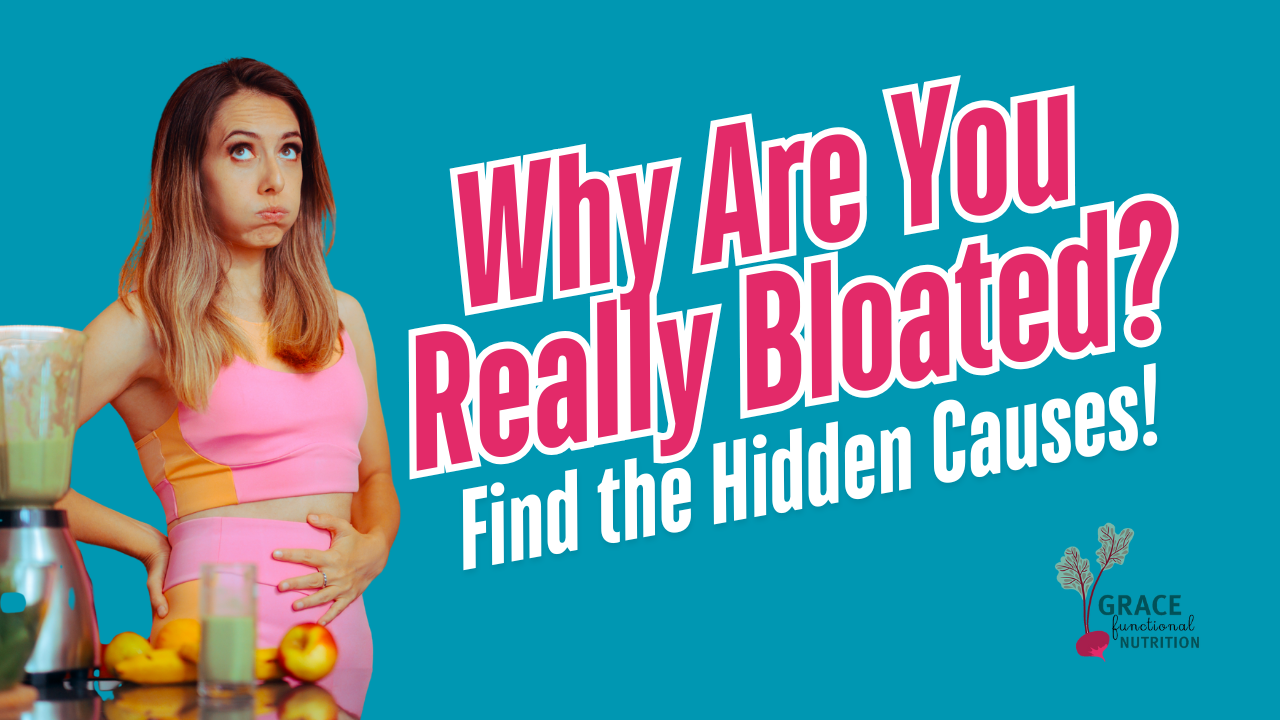Unmasking the Bloat: The 7 Hidden Root Causes Behind Your Distended Belly
By Leah Barack, Gut Health Expert & Functional Nutritionist
The 7 root causes of bloat and why you’re so bloated.
Do you wake up with a flat stomach… only to feel five months pregnant by evening? Maybe your belly still feels bloated from the day before, and you’re silently praying for a bowel movement that never comes.
This isn’t just uncomfortable — it’s a message from your body that something deeper is going on.
Bloat is a symptom, not a diagnosis. To fix it for good, you have to uncover and address the real cause.
As a gut health functional nutritionist specializing in helping women banish bloat and constipation, I’ve found that there are seven main root causes I see over and over again in my 1:1 clients. And each one requires a different approach.
1. Constipation and Slow Motility
When food moves too slowly through your intestines, gut bacteria ferment it, producing gas that causes bloating. Methane gas — often produced in constipation — worsens motility, creating a vicious cycle.
Signs you might be constipated:
Fewer than 1–3 complete bowel movements per day
Straining or discomfort during bowel movements
Feeling incomplete, even if you go multiple times a day
Until you fix motility, bloating will keep coming back — even if you treat conditions like SIBO.
2. Gut Dysbiosis
Your gut contains trillions of bacteria — some helpful, some harmful.
When harmful bacteria overgrow or good bacteria decline, it disrupts digestion and creates excess fermentation and gas.
Solution: Comprehensive stool testing can identify imbalances so you can take targeted steps to rebalance your microbiome.
3. Low Stomach Acid
Low stomach acid is one of the most overlooked causes of bloating and constipation. Without enough acid, food — especially protein — isn’t broken down properly, slowing digestion and increasing fermentation further down the digestive tract. This is one of the first things you need to fix to help get rid of bloat and improve constipation.
4. Poor Meal Hygiene
It’s not just what you eat, it’s how. Eating while rushed, distracted, or stressed puts your body in a sympathetic “fight-or-flight” state that shuts down digestion.
Better meal hygiene means:
Eating in a calm, relaxed setting
Avoiding screens and stress during meals
Chewing food thoroughly
5. Hormonal Imbalances
Fluctuations in estrogen and progesterone throughout your cycle can slow digestion, change your microbiome, and increase water retention.
Women with PMS, PMDD, or PCOS often experience more intense bloating before their period or around ovulation. Balancing hormones can help you get rid of bloat if your bloating tends to fluctuate throughout your cycle.
6. Food Sensitivities
While certain foods can temporarily trigger bloat, they are rarely the root cause. Long-term restriction can actually harm gut health by reducing microbial diversity.
Smart approach:
Remove or reduce problem foods short-term for symptom relief
Heal the gut, then reintroduce foods to maintain diversity
7. Stress and Nervous System Dysregulation
Chronic stress keeps your body in “fight or flight,” diverting blood flow away from digestion and into your extremities. Without shifting into “rest and digest,” your gut can’t function optimally — no matter how healthy your diet is.
The Takeaway
Bloating isn’t “in your head,” and you are not broken. Your body is giving you signals — and when you address the underlying root causes, you can finally feel comfortable in your body again.
If you’re tired of living in stretchy pants, planning your day around your stomach, or hoping each day will “finally” be different, now is the time to take action.
📅 Ready to get to the root of your bloat and constipation for good?
Apply here to schedule your free call and let’s create a plan for your gut health.
